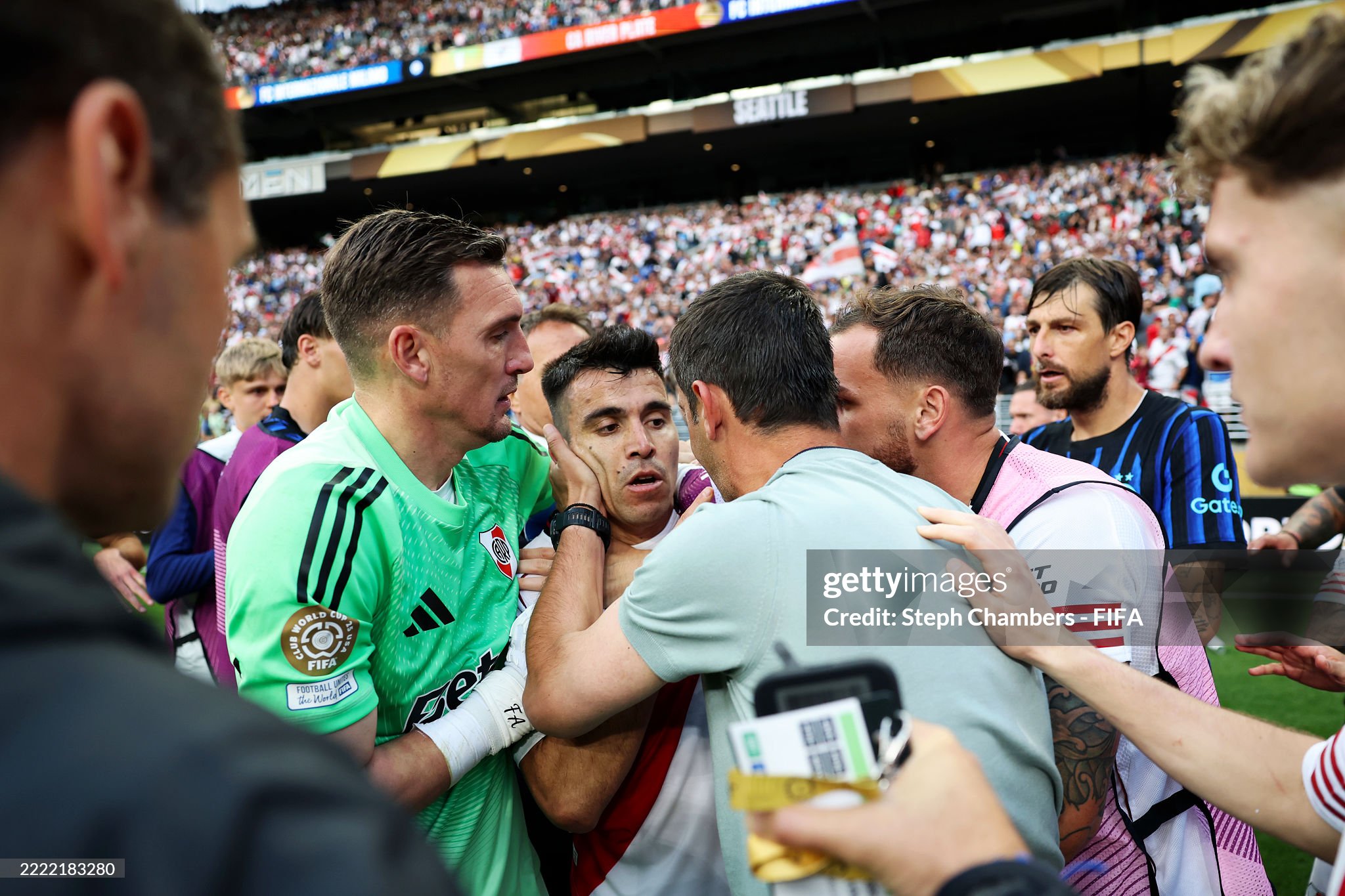Internazionale’s 2–0 win over River Plate in the Club World Cup has been overshadowed by a heated altercation involving Dutch full-back Denzel Dumfries and Argentine defender Marcos Acuña, reigniting a rivalry that traces back to the infamous 2022 World Cup quarter-final between the Netherlands and Argentina.
The match, held in Seattle, was already high-stakes as both sides were fighting for a place in the Round of 16, but it took a dramatic turn in the final minutes that drew headlines across Italy and South America.
Dumfries, a key figure for both Inter Milan and the Netherlands national team, was heavily involved in multiple incidents late in the match. Tensions reached boiling point when Acuña lunged into a forceful tackle on Dumfries near the touchline. The Inter defender immediately reacted, rising to confront Acuña with visible frustration and gesturing emphatically. That exchange quickly escalated into a scuffle involving several players, leading to pushing, shouting, and widespread unrest on the pitch.
In the heat of the moment, River Plate’s Gonzalo Montiel lost control and aggressively confronted Dumfries, earning himself a second yellow card and an early exit. Dumfries was also booked for his role in the incident. Although tempers cooled briefly, the tension between Acuña and Dumfries lingered right up to the final whistle and beyond.
Footage captured from the stands appeared to show Dumfries motioning for Acuña to follow him into the tunnel after the final whistle, as if challenging him to continue the confrontation away from the cameras. As the two began walking off the pitch, they made brief but tense physical contact before teammates and staff intervened. Dumfries made it safely into the dressing room, but Acuña had to be physically restrained and was eventually forced to the ground as emotions spilled over.
The incident dominated post-match coverage, particularly in the Italian press. La Gazzetta dello Sport labeled it “a second episode of a clash with deep-rooted tension,” directly linking it to the pair’s confrontation in the Qatar 2022 World Cup quarter-final a match filled with aggression, yellow cards, and post-match chaos. “It ended in a scuffle between Dumfries and Acuña, but that’s nothing new,” the newspaper reported. “This scene more or less repeated itself at the end of Inter vs River Plate.”
The parallels to that 2022 encounter are impossible to ignore. Back then, Argentina triumphed over the Netherlands in a penalty shootout, but not before an emotionally charged battle that included verbal exchanges, brawls, and widespread disciplinary issues many of which centered around Dumfries and Acuña. The hostility appears to have never truly faded, and Seattle witnessed the sequel in full force.
River Plate manager Marcelo Gallardo did not hide his disappointment after the match. Speaking to reporters, he expressed regret over how the evening unfolded: “It’s a shame. This is not the image of River Plate that we want to show to the world. We’re here to represent a legacy, a style of play, and an identity. What happened in the final moments does not reflect who we are.”
The result itself was significant. Inter’s comfortable 2–0 win ensured their place in the Round of 16, with goals from Marcus Thuram and Nicolò Barella sealing the deal. Simone Inzaghi’s side controlled much of the game and showed the tactical discipline that has made them a dominant force in Italian football. However, their composed performance was largely overshadowed by the late-game drama.
For River Plate, the loss means elimination from the tournament. The Argentine giants had entered the competition with high hopes, but defeats to Inter and their earlier group-stage struggles spelled an early exit. Their national rivals, Boca Juniors, suffered a similar fate, crashing out in the group phase. With both Argentine clubs out, Dumfries is unlikely to face another South American side in this tournament, ending at least for now his series of fiery clashes with Argentine opponents.
As Inter now turn their focus to the knockout rounds, questions remain about how the club and UEFA will address Dumfries’ involvement in the post-match confrontation. While no additional disciplinary action has been announced, footage of the tunnel incident is under review. For Dumfries, the night added another chapter to an already dramatic international rivalry and underscored his reputation as both a passionate competitor and a lightning rod in emotionally charged fixtures.


